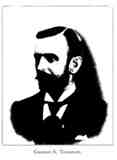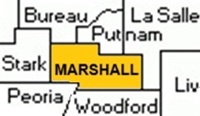
 Charles
Norris THOMPSON, deceased, was one of the best known and
most highly esteemed of the young men of Marshall county. He was
a native of the county, born in the city of Lacon, April 1,
1865, and was the son of John S. and Eliza H. (NORRIS) THOMPSON,
a sketch of whom appears elsewhere in this volume. In his native
city he grew to manhood and received his literary education in
its public schools. Later he entered Bryant & Stratton’s
Business College, Chicago, from which he graduated with honors,
and at once entered upon a business career.
Charles
Norris THOMPSON, deceased, was one of the best known and
most highly esteemed of the young men of Marshall county. He was
a native of the county, born in the city of Lacon, April 1,
1865, and was the son of John S. and Eliza H. (NORRIS) THOMPSON,
a sketch of whom appears elsewhere in this volume. In his native
city he grew to manhood and received his literary education in
its public schools. Later he entered Bryant & Stratton’s
Business College, Chicago, from which he graduated with honors,
and at once entered upon a business career.
Few men had a
brighter future before them than did the subject of this sketch.
From his youth he took an interest in the business carried on by
his father and in the office made himself generally useful.
Before attaining his majority he was made a member of the firm,
and the business was carried on under the name of J. S. Thompson
& Son, and later, when his brother, John I. THOMPSON, was
admitted to the firm, it went under the name of J. S. Thompson &
Sons, Investment Bankers. (For an account of the remarkable
success of this firm and its system of doing business see sketch
of J. S. THOMPSON.) In this business he showed great aptitude
and became thoroughly proficient in every department. His
judgment of men was good, and he was ever considerate of others.
In 1885, while but twenty years of age, he was elected assistant
cashier of the First National Bank of Lacon, a position he held
until the time of his death, the duties of which he discharged
faithfully and well, to the entire satisfaction of the directors
of the bank and its patrons.
On the 8th of October, 1885,
Mr. THOMPSON was united in marriage with Miss Ada BURNS,
daughter of Judge John BURNS of Lacon, Illinois. Their wedded
life of a little over ten years was a happy one, and it can be
truly said that they lived in each others love. Mrs. THOMPSON
was reared in Lacon, and was there educated in the public
schools and later attended Eureka College. She is a lady of fine
tastes and accomplished in art and music. She now makes her home
at Colorado Springs, Colorado, in an elegant home left her by
her husband.
For four long weary years Mr. THOMPSON was
an invalid. Three years of this time he was almost daily
consumed with a burning fever, yet it is said that he never
complained.
E had promise of a bright future in life and
was anxious to live, to care for and to be a comfort to his
loved ones. Yet, when it was evident that he must give up this
world he nobly and quietly yielded to the Divine will. The last
few months he dwelt much on the world to come. His Christian
experience was bright and clear and full of hope and joy. A
short time before his death when his friends were bending
anxiously over him to catch every gesture, word and look, before
he passed to the Great Beyond, his face lighted up with a
radiant, heavenly smile, and pointing upward he exclaimed in a
clear voice: “O! see the brightness.” His father did not look,
and with his own hand he turned his father’s face upward and
said: “Look quick.” Who can say that the heavenly spirits were
not awaiting his coming?
No greater tribute could be paid
him than this – aside from the sorrow his illness caused, he
never gave his parents one hour of sorrow. Though dying far from
home, his sweet, gentle ways drew to him many loving friends,
who, with flowers, loving words and deeds comforted him and his
beloved ones in the last days as if they were old-time friends.
Among these pleasures were the letters of a number of little
Indians from the Indian school of Phoenix, which he treasured.
A few days before his death he said to his father: “I am
sorry for you and all our loved ones. You will have to toil and
be anxious about many things, while I will be happy all the
time, and be with mother. She has been waiting for me twenty
years.” Another time he said in broken words: “It is harder for
you than of me.” At another time: “Father, have the preacher
tell all the boys to be sure and meet me in heaven. I love them
all; yes, I love every one.” Truly, it may be said Charlie
THOMPSON loved every one and had not an enemy in the world. His
last message to his brother Jon I., and sisters Jennie and Emma
Mai, were: “To be good and do good,” and later, to emphasize it,
he said: “Set it down, lest a mistake be made.” Truly, he stuck
the keynote when he said in substance: “Become good that you may
do good.”
Far from his loved home, in the city of
Phoenix, Arizona, he was called to rest, his death occurring
February 22, 1896. To that place he had gone, accompanied by his
loved wife and parents, with the hope that the bracing climate
of that state might do him good. But it was not to be. While in
Colorado Springs, Colorado, he gave his heart to the Lord and
united with the Methodist Episcopal church at that place, and
when the end came he was prepared to go. He was also a Mason,
Knight Templar and a member of the Knights of Pythias societies.
The circle of friends of Mr. THOMPSON was not confined to
his Illinois home, for warm personal friends came to him at
Colorado Springs and at Phoenix, Arizona, where he passed his
last days on earth, so sad yet precious to his loved ones. The
bereaved wife and parents received their many tokens of tender
love and sympathy. The friends of the family and of Charles sent
messages of condolence from many parts of the United States. His
remains were brought to Lacon for interment. The public schools
and business houses of Lacon closed during the funeral services,
which were held in the Methodist Episcopal church, which, large
as it is, could not contain the people, many of whom were turned
away. The Rev. T. C. Moots conducted the services and was
assisted by Rev. L. B. Kent, who twenty years previous had had
charge of the Lacon Methodist Episcopal pulpit, and preached his
mother’s funeral sermon; Rev. Long of the Congregational church,
and Rev. Hammond, Episcopal church, all representing the united
pulpits filled in Lacon. The floral tributes were worthy of more
than a passing notice and covered the platform in set pieces,
palms, ferns, roses and callas. The M. E. Quartet rendered the
songs selected by himself, “Jesus, Lover of My Soul” and “In the
Sweet Bye and Bye,” singing at the final resting place “Silently
Lay Him to Rest, God Thought it Was Beset.”
The Knights
of Pythias and Masonic orders were largely represented and the
beautiful Masonic burial service took place in its most
impressive and perfect manner. Such a life is a benediction to
all who come in contact with it, and will bear precious seed for
many years.
Extracted March 2011 by Norma Hass from The Biographical Record of Bureau, Marshall and Putnam Counties, Illinois, 1896.
| Bureau Putnam La Salle | |||
| Stark |
 |
||
| Peoria | Woodford | ||

